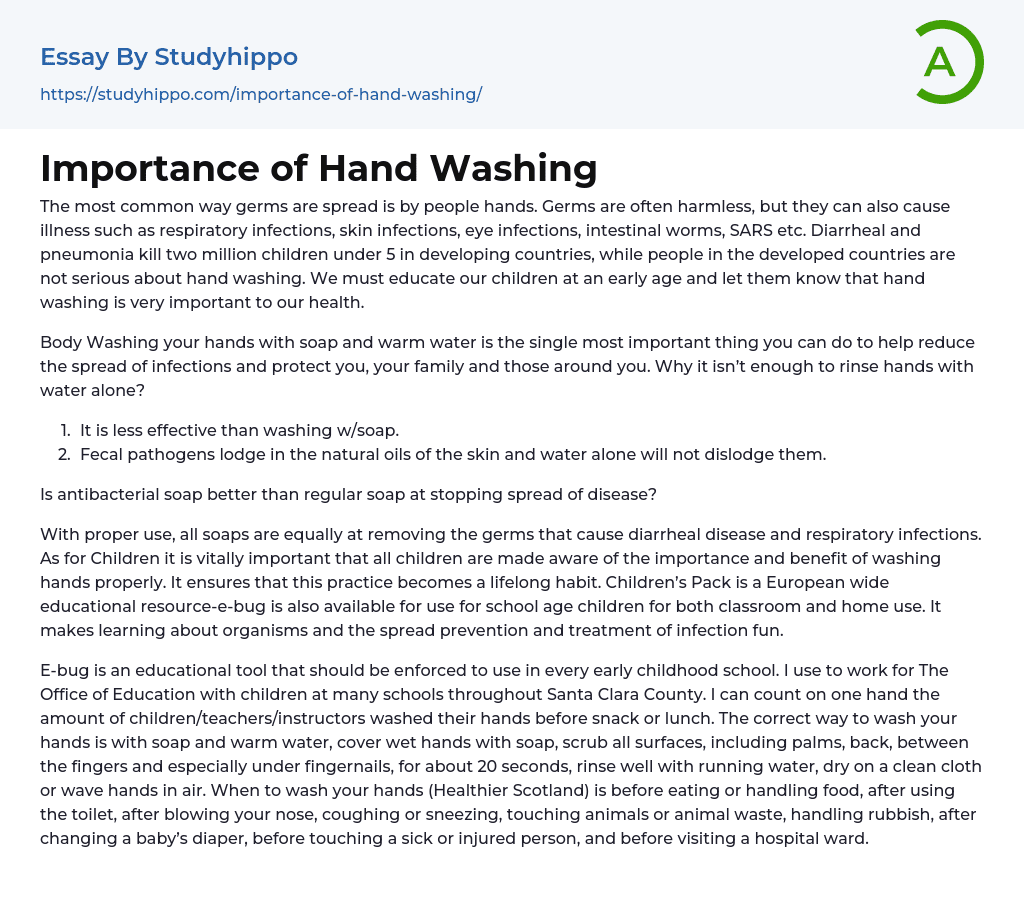The primary mode of germ transmission is through human hands. Although usually not dangerous, they can result in various illnesses such as respiratory infections, skin infections, eye infections, intestinal worms, and SARS. In less developed countries, a lack of knowledge about hand washing causes the deaths of two million children under 5 years old each year from diarrhea and pneumonia. Conversely, people in more advanced nations often underestimate the significance of hand hygiene. Hence, it is essential to educate our children from an early age about the importance of hand washing for maintaining good health.
Washing your hands with soap and warm water is the most important step in reducing infection transmission and protecting yourself, your family, and others. Merely rinsing hands with water is not enough.
-
It is less effective
...
than washing w/soap.
- Fecal pathogens lodge in the natural oils of the skin and water alone will not dislodge them.
All soaps have the same effectiveness in removing germs that lead to diarrheal disease and respiratory infections when used correctly. It is vital to teach children about the significance and advantages of proper handwashing to ensure they continue this practice throughout their lives. The Children's Pack is a educational resource available across Europe that is suitable for school-age children, whether in classrooms or at home. Moreover, e-bug provides an enjoyable way to learn about organisms, preventing infections, and treating them.
E-bug is an educational tool that should be made compulsory in all early childhood schools. While working for The Office of Education in Santa Clara County, I observed
View entire sampleJoin StudyHippo to see entire essay
lack of handwashing among children, teachers, and instructors before snack or lunch. Proper handwashing involves using soap and warm water, applying soap to wet hands, scrubbing all surfaces (including palms, back, between fingers, and under fingernails) for about 20 seconds, rinsing thoroughly with running water, and drying either with a clean cloth or by air-drying. Healthier Scotland recommends washing hands before eating or handling food, after using the toilet or blowing your nose/coughing/sneezing, touching animals/animal waste or garbage; changing a baby's diaper; prior to touching a sick/injured individual; and before visiting a hospital ward.
- Social Care essays
- Epidemiology essays
- Drug Addiction essays
- Hiv essays
- Hygiene essays
- Obesity essays
- Teenage Pregnancy essays
- Birth Control essays
- Eating Disorders essays
- Causes Of Obesity essays
- Children Obesity essays
- Apoptosis essays
- Asthma essays
- Black Death essays
- Breast Cancer essays
- Cholesterol essays
- Chronic essays
- Chronic Pain essays
- Death essays
- Diabetes essays
- Down Syndrome essays
- Epidemic essays
- Hypertension essays
- Infection essays
- Infertility essays
- Myocardial Infarction essays
- Pain essays
- Pathogen essays
- Pregnancy essays
- Sexually Transmitted Disease essays
- Symptom essays
- Tuskegee Syphilis Experiment essays
- Water supply essays
- John Locke essays
- 9/11 essays
- A Good Teacher essays
- A Healthy Diet essays
- A Modest Proposal essays
- A&P essays
- Academic Achievement essays
- Achievement essays
- Achieving goals essays
- Admission essays
- Advantages And Disadvantages Of Internet essays
- Alcoholic drinks essays
- Ammonia essays
- Analytical essays
- Ancient Olympic Games essays
- APA essays
- Arabian Peninsula essays




